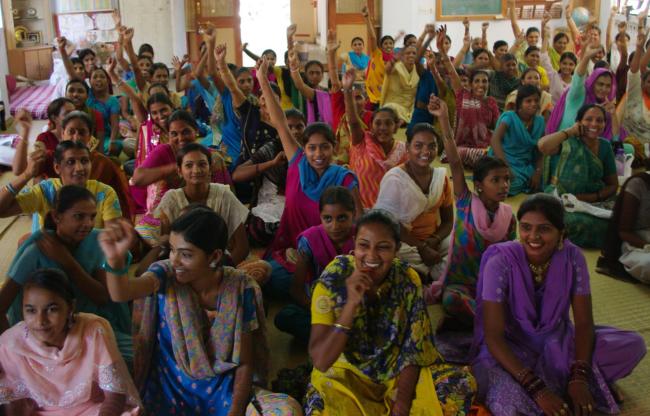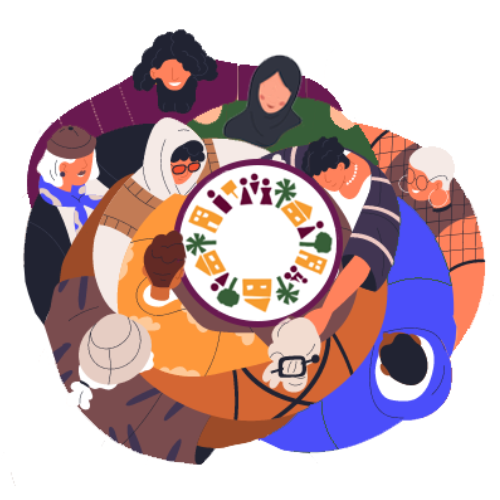Résumé
Des discussions de groupe menées avec des travailleuses du secteur informel dans des villes au Brésil, au Ghana, en Inde, en Afrique du Sud et en Thaïlande, montrent que les services de garde d’enfants constituent des sources de revenue significatives pour les femmes travaillant dans le secteur informel.
Article by Rachel Moussie[i]

Photo: Paula Bronstein/Getty Images Reportage
Women’s economic empowerment is a central feature of development debates today. A key focus is the economic and social benefits that arise from women’s greater and more equal participation in the labour market. Calls for improving pay and working conditions, eliminating legal barriers to women’s economic engagement, and greater financial and digital inclusion to support women-led enterprises feature as key recommendations for empowering women.
Equally critical is the need for quality public and affordable care services that partially relieve women and girls of the responsibility of caring for young children, aging parents, or those who are ill. Without access to quality care services, it is women who take time off work to provide care, or girls who sacrifice their education to help out at home. Where services are provided, care is often inadequate, leaving children in potentially unsafe environments.
In a global context, where the informal economy continues to grow, a larger proportion of women than men find work in the informal, rather than the formal, economy. Ignoring women in the informal economy will undermine any attempts to increase the productivity of women-owned enterprises or reduce the gender gaps in the labour market – both now and in the future. Informal women workers’ economic empowerment will not be realized until they have access to quality and affordable child care.
Why Working Poor Women Need Better Child Care
Women in Informal Employment: Globalizing and Organizing (WIEGO)conducted focus group discussions with women informal workers in cities in Brazil, Ghana, India, South Africa, and Thailand to assess their child care needs. The research was done through member-based organizations of workers, and the findings show that child care responsibilities have a significant impact on women informal workers’ earnings. Home-based workers explain how attending to their children at home reduces the amount of hours they can work and decreases their productivity. Street vendors and market traders cannot work if it is raining or too hot to take their children outdoors with them.
“When you sell food with a child who is just some months old and you breastfeed and change diapers alongside, people don’t buy from you because of the unpleasant scene these things create; they see it as disgusting and so is the food.” – Ghanaian trader
Many did not have a parent they could rely on to take care of their children, and if someone was available, they expected payment or financial support. In Thailand, grandmothers engaged in home-based work in order to care for their grandchildren, as their children’s wages were not enough to cover all the expenses.
“I’m not pleased about looking after the grandchildren. … If I don’t do it my children can’t go to work. … We are being squeezed to death, my husband and I.” – Thai home-based worker
Cash transfers can address some of the costs associated with child care. However, in most countries the amount transferred falls woefully short of the real costs of children; therefore, poorer women and men have to earn an income to care for their children.
Policy Options
The International Labour Organization’s (ILO) Convention on Social Security (C102) identifies family benefits as one of nine core work contingencies – recognizing that the time required to care for a young child can compromise workers’ present and future earnings. This provides a basis from which to frame quality child care services as a component of social protection systems. Informal workers’ organizations, trade unions, women’s rights’ and child rights’ organizations all have a stake in promoting care-sensitive social protection systems for all workers and their children.
Higher earnings and regular working hours would leave informal workers with more resources to address their child care needs – both in terms of having more income and more time to care for their children themselves. In the focus group discussions, women workers spoke of the guilt and frustration they felt in not being able to adequately care for their children or spend time with them. Workers’ organizing to improve their working conditions and earnings is essential to making an impact.
For example, domestic workers, a significant share of whom are women, not only require support for their child care needs, but are also child care providers. Through their organizing efforts, domestic workers successfully advocated for ILO Convention C189, which provides a foundation for them to realize rights at work. Ratifying C189 – as 22 countries across Africa, Asia, Europe and Latin America have done – can be a first step toward improving working conditions for domestic workers and giving them more resources to care for their own children.
Established public child care services exist in many countries. In India, the Integrated Child Development Service started in 1975 and now reaches 83-million children through 1.4 million centres across the country. Scaling up these initiatives to ensure universal coverage remains a challenge in light of budget restrictions. One response by governments is to privatize these services to fill the funding gap, but informal workers note that high costs due to privatization are the most significant barrier to accessing child care services. In Thailand, the government is piloting a child support grant targeted at households that earn less than 3,000 baht per month ($86 USD). The grant complements established public child care services available for children from 2.5 – 5 years old, though a gap in public provision remains for children who are below 2.5 years old.
Public investments in child care are necessary if they are to reach the large share of women and men working in the informal economy. Rather than a drain on scant public resources, investing in quality child care can lead to a triple dividend by increasing access to formalized jobs for women workers, improving health and education outcomes for children, and spurring employment creation to stimulate economic growth. The provision of quality child care would augment the impact of cash transfers and go further in curbing child poverty and supporting more women workers to earn a higher income.
For more information, read about our Child Care Initiative here (http://www.wiego.org/blog/child-care-women-informal-workers-proves-essential-earning-power).
[1] Rachel Moussié is the Deputy Director of the Social Protection Programme at Women in Informal Employment: Globalizing & Organizing (WIEGO).






